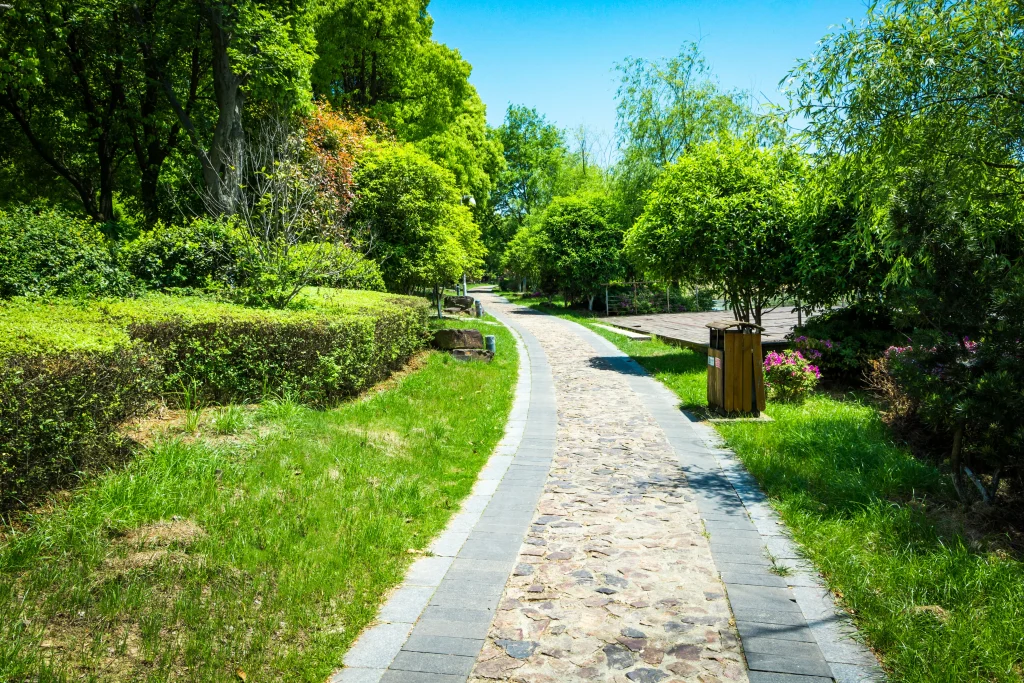If you’ve ever stood in a landscape supply yard wondering “how much does mulch cost per yard,” you’re not alone. Most Denver homeowners have a vague sense that mulch comes by the “yard,” but translating that into actual costs – and figuring out how many yards you need – can feel like solving a math puzzle.
Here’s what you need to know: bulk mulch material typically costs between $30 and $80 per cubic yard in Denver, depending on the type and quality you choose. When you add delivery and professional installation, expect to pay $70 to $130 per yard for a complete service.
But those ranges can shift based on what you’re buying, where you live in the metro area, and how much you order. In this guide, you’ll learn:
- What mulch costs per yard look like in Denver
- How to calculate exactly how many yards your project needs
- When bulk makes sense versus bagged mulch
- Which mulch types offer the best value
- Money-saving tips specific to the Denver area
By the end, you’ll know exactly how to budget for your mulching project.
How mulch is measured: cubic yard, bags, and “scoops”
What is a cubic yard?
A cubic yard is simply a cube measuring 3 feet × 3 feet × 3 feet, which equals 27 cubic feet of material. Think of it as a box that’s waist-high and arm-width on all sides. That’s your baseline measurement for bulk mulch.
Understanding this conversion helps when you’re comparing options:
- 1 cubic yard ≈ 13.5 bags of 2 cu. ft. mulch
- 1 cubic yard ≈ 9 bags of 3 cu. ft. mulch
When you see “price per yard of mulch,” suppliers mean one cubic yard of loose material, usually delivered in a pile to your driveway.
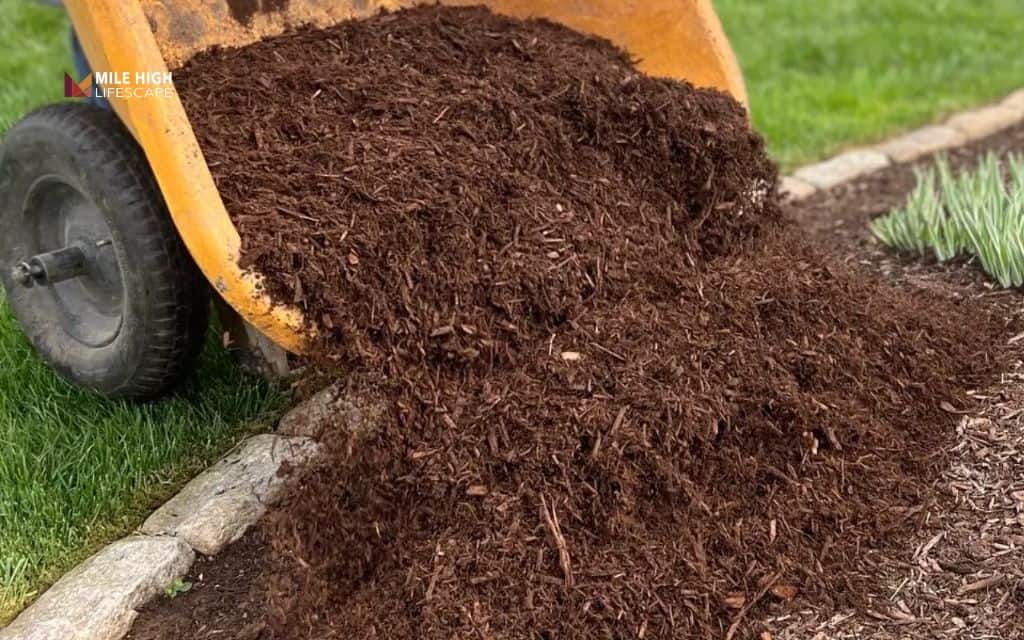
Bag vs bulk vs “scoop”
Bagged mulch comes in 1.5 to 3 cubic foot bags that you’ll find stacked at garden centers. These are perfect for small touch-ups or when you need just enough to fit in your car. However, when you calculate the cost of mulch per yard by counting bags, you’ll often pay significantly more than buying bulk.
Bulk mulch (sold by the yard) arrives via dump truck or gets loaded into your trailer at the landscape yard. For projects requiring 2 or more yards, bulk almost always wins on price.
“Scoop” is landscape yard lingo for one loader bucket of material. Depending on the supplier, one scoop typically equals 0.5 to 1 cubic yard. Always ask “how many scoops per yard” at your specific supplier to avoid ordering confusion.
How much does mulch cost per yard?
Typical national 2025 price ranges
Across the United States, bulk mulch materials range from $25 to $100 per yard. The variation comes from regional availability, material processing, and local market conditions.
Professional installation adds labor costs. Nationally, installed mulch runs $50 to $150 per yard. This includes delivery, spreading, and edge definition.
Average prices in Colorado & the Denver metro area
Colorado’s Front Range shows tighter pricing due to regional suppliers and competitive markets. Delivered and spread wood mulch averages $70 to $90 per yard across most of the metro area.
Denver specifically sees installed mulch costs of $80 to $170 per yard. Several factors create this range:
- Mulch type affects the base price. Natural hardwood costs less than dyed or premium options. Cedar and playground mulch command higher prices.
- Site access changes labor requirements. Easy access with a clear path from driveway to beds keeps costs down. Slopes, narrow gates, or long distances from the dump pile to beds increase labor time.
- Total yardage influences per-yard pricing. Order 10 yards and you’ll typically pay less per yard than ordering 2 yards. Volume discounts apply to both material and labor.
- Bed preparation adds cost if needed. Removing old mulch, pulling weeds, installing landscape fabric, or defining bed edges requires extra time and effort.
- Minimum charges apply to small orders. Many companies set minimums of $200 to $300 for delivery and installation, regardless of yardage.
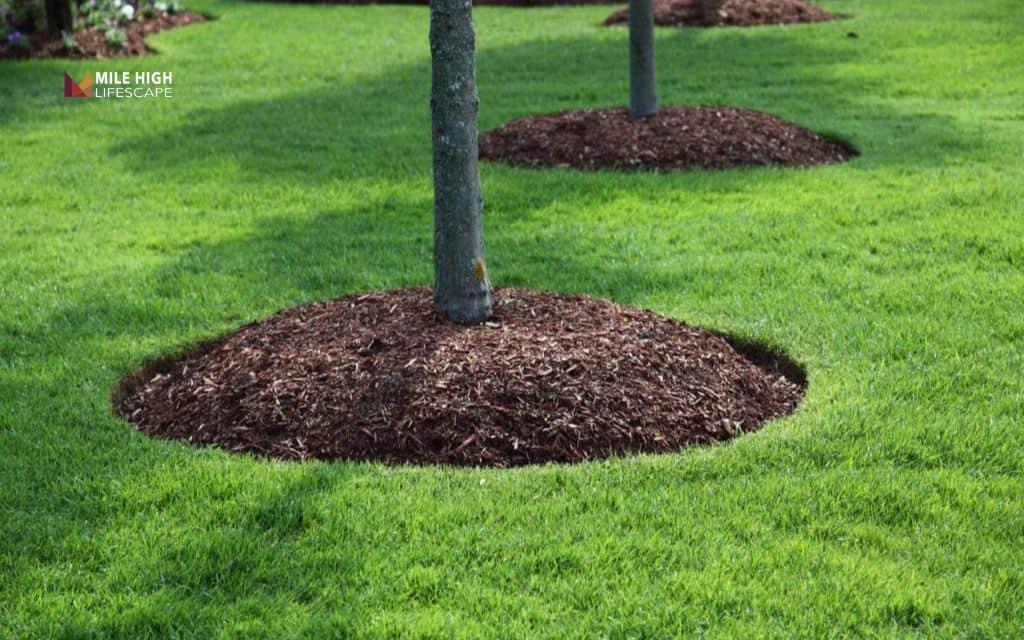
Mulch cost by type: What different mulches cost per yard?
Mulch type drives more price variation than any other factor. The material, processing method, and longevity all affect the cost per yard.
| Mulch Type | Approx. $/Yard | Typical Lifespan | Best Use |
| Natural Hardwood | $30-$55 | 1-2 years | Most garden beds, trees, shrubs |
| Dyed Mulch | $40-$65 | 1-2 years | Front yards, visible areas |
| Cedar | $55-$90 | 2-3 years | Pest-prone areas, longer-lasting coverage |
| Compost/Leaf | $20-$45 | 1 year | Vegetable gardens, soil improvement |
| Rock/Gravel | $45-$80 | Permanent | Xeriscape, drainage areas, paths |
| Rubber | $100+ | Permanent | Playgrounds, high-traffic areas |
Natural hardwood / bark mulch (undyed)
Natural hardwood and bark mulch represent the most economical choice. Denver bulk prices typically run $30 to $55 per yard for standard grades.
This mulch breaks down gradually, improving your clay soil over time. Plants benefit from the slow nutrient release. The natural brown color blends with most landscapes.
The material comes from shredded or ground hardwood trees. Processing is minimal, which keeps costs down. Suppliers source it locally from tree removal services and lumber operations.
Dyed mulch (black, brown, red)
Dyed mulch adds color stability and visual appeal. Denver suppliers charge $40 to $65 per yard for dyed options.
The dying process adds cost. Manufacturers spray the mulch with colorant after shredding. Black, brown, and red are the standard choices. Black mulch creates dramatic contrast. Brown mulch looks natural. Red mulch makes bold statements.
Premium & specialty mulches (cedar, playground, etc.)
Premium mulches cost $55 to $90 per yard in the Denver area. This category includes cedar, playground-certified mulch, and other specialty products.
Cedar mulch offers natural insect resistance. The aromatic oils repel many pests. It lasts longer than hardwood. The lighter weight makes spreading easier. Cedar grows locally in the Colorado mountains, but processing and transportation add cost.
Playground mulch meets safety standards for cushioning falls. Certification requires specific particle sizes and impact absorption testing. Schools, parks, and families with play equipment choose this option despite the higher price.
Other organic mulches (compost, leaf mulch, mushroom, etc.)
Compost and leaf mulch typically cost less than decorative bark. Denver prices range from $20 to $45 per yard. These materials improve soil quality more than decorative options.
Compost mulch adds organic matter, improves drainage, and feeds beneficial microbes. The dark color absorbs heat, extending the growing season in our short summers. Leaf mulch breaks down faster than bark. Plan to replenish it annually. The rapid decomposition benefits vegetable gardens and annual beds where you want quick soil improvement.
Mushroom compost costs slightly more but offers concentrated nutrients. It works well for establishing new beds or rejuvenating tired soil.
Inorganic mulch (rock, gravel, rubber)
Rock and gravel run $45 to $80 per yard, similar to premium wood mulch. The key difference is longevity. Rock lasts indefinitely with minimal maintenance.
Rubber mulch represents the most expensive option, often exceeding $100 per yard. It never decomposes. The rubber stays in place better on slopes. Playground applications and high-traffic areas justify the cost for some homeowners.
Comparing organic and inorganic options helps you make long-term budget decisions. Wood mulch costs less upfront but requires regular replacement. Rock costs more initially but needs only occasional topping up after years of use.
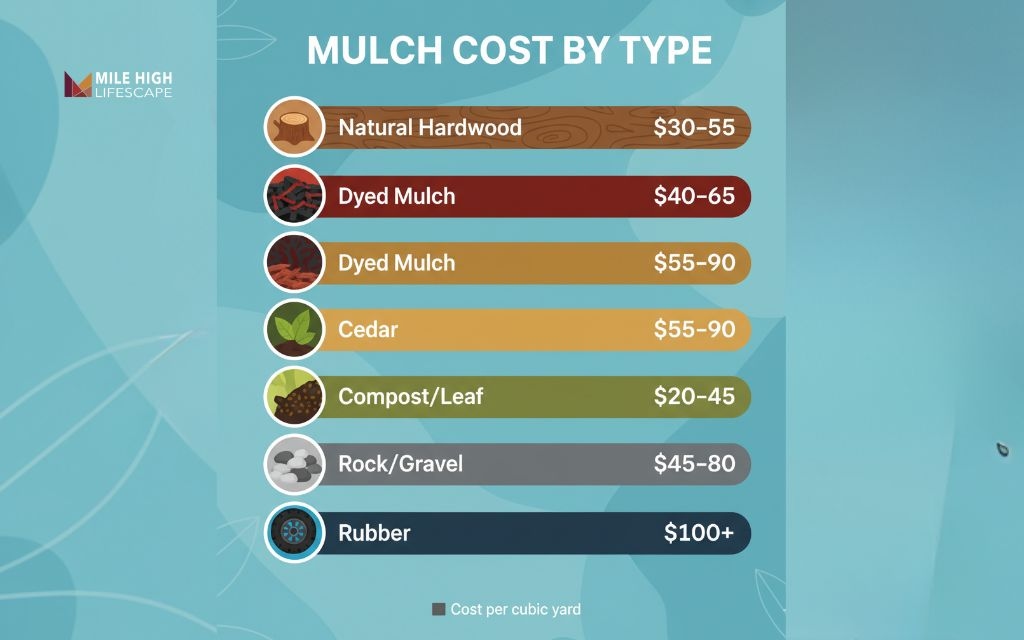
How much mulch do you actually need?
The basic formula
Calculate your mulch needs with this simple formula: Area (square feet) × Depth (inches) ÷ 324 = Cubic yards needed
Quick reference points help you estimate on the spot:
- 1 yard at 3 inches deep covers about 100 square feet
- 1 yard at 2 inches deep covers about 160 square feet
- 1 yard at 4 inches deep covers about 80 square feet
Most homeowners underestimate the volume they need. Measure twice, order once. Running short means paying extra delivery fees for a second trip.
Recommended depth
- New beds need 3 inches of mulch for effective weed suppression and moisture retention. This depth creates a barrier against weed seeds while allowing water and air to reach the soil.
- Annual top-up applications require only 1 to 2 inches. You’re refreshing the layer, not building from scratch. The old mulch has partially decomposed, leaving beneficial organic matter in the soil.
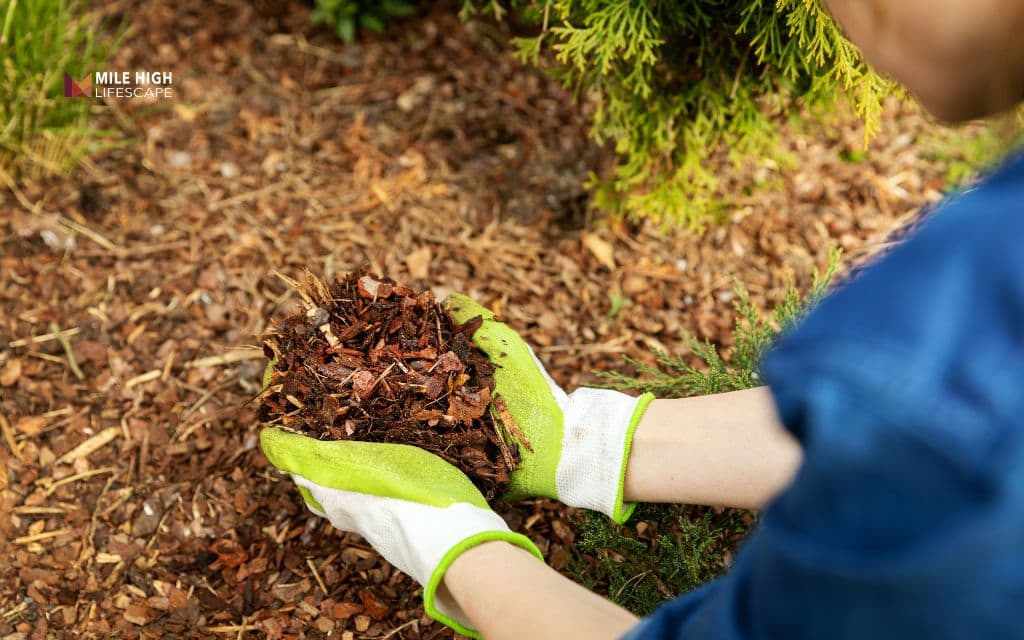
What makes mulch prices go up or down?
Mulch type & quality
As we covered earlier, natural hardwood runs cheaper than dyed varieties, which cost less than premium cedar or playground mulch. More processing, certification, or specialty materials drive up the cost of mulch per cubic yard.
Total volume & bulk discounts
Landscape suppliers reward larger orders with better pricing:
- 1 – 2 yards: You’ll pay the highest per-yard rate
- 3 – 5 yards: Moderate pricing, often hits delivery minimums
- 5 – 10+ yards: Bulk discounts kick in, per-yard cost drops significantly
- 10+ yards: Best rates, and delivery fees often get reduced or waived
Delivery distance & access
Distance from the supplier’s yard to your property affects delivery fees. Most suppliers include delivery within 10-15 miles at no extra charge. Beyond that, expect $1 to $3 per mile.
Difficult access triggers premium charges:
- Narrow streets requiring smaller trucks
- Long distances from dump site to beds (requires wheelbarrow work)
- Steep slopes or stairs
- Dumps on the street requiring permits
Some neighborhoods ban truck dumping on streets. You’ll need to arrange alternative delivery locations or pay for wheeled delivery directly to beds.
Site conditions & prep work
Installation costs rise when your beds need preparation work. Clean, weed-free beds with defined edges allow quick spreading. Problem beds require extra labor.
Common prep tasks that increase costs:
- Removing old, compacted mulch
- Pulling established weeds
- Installing or replacing landscape fabric
- Defining or re-cutting bed edges
- Clearing debris and leaves
- Grading uneven surfaces
Some companies charge hourly for prep work. Others quote a flat rate after seeing your property. Get specific quotes in writing that detail what prep work is included.
Season & timing
Spring brings peak mulch demand in Denver. March through May sees the highest prices and longest wait times. Everyone wants mulch before summer heat arrives.
Off-peak advantages appear in several areas:
- Late fall orders (October-November) often get discounts
- Winter scheduling allows early-spring installation at last year’s prices
- Mid-summer can bring slower periods with promotional pricing
- Booking early in the season beats the rush and locks in rates
For nearly two decades, Mile High Lifescape has served Denver Metro homeowners with competitive mulch installation pricing. Call (303) 877-9091 to discuss your project and get a free quote based on your specific needs and timing.
How to reduce mulch costs in Denver
- Choose bulk over bagged for any project needing 2 or more yards. The math favors bulk as soon as you pass the 1.5-yard mark. Yes, you’ll need to handle a pile and do wheelbarrow work, but you’ll save $30 to $50 per yard.
- Pick undyed hardwood mulch if color doesn’t matter to you. Natural mulch costs $10 to $15 less per yard than dyed options. It performs the same functions. The brown color looks appropriate in most landscapes. Save the premium colored mulch for highly visible front beds only.
- Do your own bed preparation. Professional installers charge $30 to $50 per hour for prep work. Spend a weekend pulling weeds, raking old mulch, and defining bed edges yourself. You’ll save hundreds on medium to large projects.
- Use compost or leaf mulch in less visible areas. Back beds, side yards, and utility areas don’t need decorative mulch. Compost costs $10 to $20 less per yard and improves your soil faster than bark products. Use the expensive stuff where people see it.
- Calculate carefully to avoid over-ordering. Use the formula earlier in this guide. Measure your beds accurately. Over-ordering wastes money. Under-ordering triggers extra delivery charges for a second trip.
- Consider stone mulch for permanent areas. Front Range yards benefit from xeriscaping. Stone costs more upfront but lasts 10+ years with no replacement. Calculate the long-term cost per year rather than just the initial per-yard price.
- Ask about free delivery thresholds. Many suppliers waive delivery fees on orders over 5 or 10 yards. If you’re close to the threshold, adding an extra yard or two to hit free delivery saves money overall.
Conclusion
Understanding mulch costs per yard removes the guesswork from your landscaping budget. Denver prices follow predictable ranges once you know what drives the variations.
Mulch represents one of the smartest investments you’ll make in your property. Proper mulching saves water in Denver’s dry climate. It suppresses weeds without chemicals. It moderates soil temperature during our extreme temperature swings. It improves your clay soil as it decomposes.
Stop guessing what you’ll pay. Start making informed decisions based on real Denver pricing data. Your curb appeal, water bills, and garden health all improve when you get mulch right.
____________
For nearly two decades, Mile High Lifescape has helped Denver Metro homeowners create beautiful, water-efficient landscapes. Our mulch installation services include bed preparation, professional spreading, and complete cleanup.
Contact us at (303) 877-9091 or hello@milehighlifescape.com for a free quote on your project. We’re located at 1007 S Federal Blvd Ste A, Denver, CO 80219.
Frequently asked questions (FAQs)
How much does mulch cost per yard in Denver?
– Bulk mulch material costs $30 to $75 per yard in 2025.
– Natural hardwood runs $30 to $55 per yard.
– Dyed mulch costs $40 to $65 per yard.
– Premium options like cedar reach $55 to $90 per yard.
These prices apply to material only at the supplier’s yard or delivered to your property without installation.
How much is a yard of mulch delivered?
Delivered mulch in Denver adds $50 to $100 to your material cost, depending on distance and access. Larger orders spread delivery costs across more yards, reducing the per-yard delivered price. Free delivery often applies to orders of 10 yards or more.
What’s the cost per yard of mulch installed vs DIY?
Professional installation in Denver costs $70 to $130 per yard including material, delivery, spreading, and cleanup. DIY costs run $40 to $65 per yard for delivered material. You save $30 to $65 per yard doing it yourself. A 5-yard project costs $350 to $650 installed versus $200 to $325 DIY. Factor in your time, physical ability, and tool access when deciding.
How much does dyed mulch cost per yard compared to natural mulch?
Dyed mulch costs $10 to $15 more per yard than natural hardwood mulch in Denver. Natural hardwood runs $30 to $55 per yard. Dyed versions cost $40 to $65 per yard. Black mulch typically commands the highest price within the dyed category. The color treatment adds processing cost but provides longer-lasting visual appeal in highly visible areas.
How many yards do I need for my flower beds?
Calculate your needs using this formula: square feet × depth in inches ÷ 324 = cubic yards. A 100-square-foot bed at 3 inches deep needs 0.9 yards (order 1 yard). A 300-square-foot area at 2 inches needs 1.85 yards (order 2 yards). Measure each bed’s length and width. Multiply to get square feet. Add all beds together for your total project needs.
How many yards do I need for my front yard?
Front yard mulch requirements vary by landscape design. Measure all mulched areas: foundation beds, tree rings, island beds, and border plantings. Add the square footage. Apply the formula: total square feet × desired depth (3 inches for new beds, 2 inches for refresh) ÷ 324. Most Denver front yards need 3 to 8 yards for complete coverage at proper depth.
